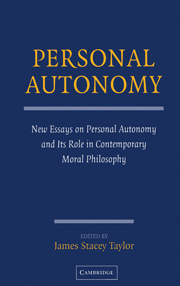Book contents
- Frontmatter
- Contents
- List of Contributors
- Acknowledgments
- Introduction
- PART I THEORETICAL APPROACHES TO PERSONAL AUTONOMY
- PART II AUTONOMY, FREEDOM, AND MORAL RESPONSIBILITY
- 8 Autonomy and Free Agency
- 9 The Relationship between Autonomous and Morally Responsible Agency
- 10 Alternative Possibilities, Personal Autonomy, and Moral Responsibility
- 11 Freedom within Reason
- PART III THE EXPANDING ROLE OF PERSONAL AUTONOMY
- Index
11 - Freedom within Reason
Published online by Cambridge University Press: 03 December 2009
- Frontmatter
- Contents
- List of Contributors
- Acknowledgments
- Introduction
- PART I THEORETICAL APPROACHES TO PERSONAL AUTONOMY
- PART II AUTONOMY, FREEDOM, AND MORAL RESPONSIBILITY
- 8 Autonomy and Free Agency
- 9 The Relationship between Autonomous and Morally Responsible Agency
- 10 Alternative Possibilities, Personal Autonomy, and Moral Responsibility
- 11 Freedom within Reason
- PART III THE EXPANDING ROLE OF PERSONAL AUTONOMY
- Index
Summary
Perhaps no problem in philosophy is easier to motivate than the problem of free will, for it is not just philosophers occupied with academic puzzles but thoughtful people of all sorts who can be struck and upset by the thought that the direction of their lives might be determined by things wholly beyond their control. In earlier times, this thought was perhaps chiefly connected with the contemplation of the idea of divine predestination. Today, the worry that there is no such thing as free will might as easily arise from other sources. Free will seems to be threatened not only by what may be called divine determinism, but also by psychological determinism – that is, by the view of human psychology that holds that one's interests and beliefs and values, and consequently one's decisions for action, are wholly a product of one's heredity and environment. Moreover, the very reality of our status as valuing, deliberating agents whose thoughts, desires, and wills are effective in guiding our behavior can be called into question by the scientific perspective that views human beings as wholly physical creatures whose behavior, like the behavior of all other natural objects, can be completely explained in terms of the interaction of atomic or subatomic particles.
I have said that we are “upset” by the thought that we may not have free will. But, to quote Mad Magazine, “Why worry?” What difference does it make if we lack free will? Because people differ in the aspects of the freewill problem that concern them and because philosophical discussions of this issue vary accordingly, it is best to be explicit about the specific worries one cares to address.
- Type
- Chapter
- Information
- Personal AutonomyNew Essays on Personal Autonomy and its Role in Contemporary Moral Philosophy, pp. 258 - 274Publisher: Cambridge University PressPrint publication year: 2005
- 9
- Cited by



